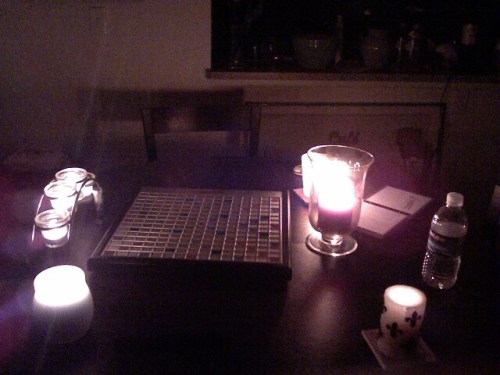
This is the last week of summer for Oakland Public Schools — school starts on Monday. We let bedtime for our six-year-old slip a little later over most of the summer. Even on days she had camp, the camp drop-off was usually later than her regular 8:30am school day. Like many kids she gets a huge energy burst right as it’s time to go to bed, so bedtime is often a struggle.
Ever since we did our no artificial light experiment several years ago, we’ve been turning lights way down in the evening. Even so, our daughter wasn’t getting to sleep until 9:45pm up until last week. Knowing we’d all have to be bright-eyed and bushy-tailed at 7am once school began, we started to worry about how to get back on schedule.
Luckily we remembered how well turning off the lights had worked in terms of getting all of us to bed earlier, so we tried that. If our daughter hadn’t already brushed her teeth before the sun went down, we allowed her to bring her flashlight to the bathroom, but no overhead lights, no lamps, etc. When it’s dark, it’s time for sleep … so get the book reading in early while you still can.
We’ve added some fun rituals: lighting candles, a few minutes reading by a low-lumen wind-up flashlight, the adventure of getting to bed in the semi-dark.
Short explanation: blue-wavelength light (emitted by light bulbs and screens, but not candles) prevents serotonin from converting into melatonin. The latter makes you sleepy. So keeping lights off in the evening helps you get sleepy (and thus go to sleep) earlier. Think camping.
The other factor is FOMO: fear-of-missing-out. With all the lights off in the house, our daughter is less concerned with what we are doing while she’s supposed to be going to sleep. A dark house seems more boring, which in this case is a good thing.
So the experiment is working … we’ve shaved 15 minutes off of bedtime every night since we started, and last night she was asleep by 8:45. The goal is 8:30 so we’re getting close. Most kids her age need at least 10 hours (at least if you want a kid in a good mood who can pay attention to stuff), so that works.
As for myself and Kia, we’re still staying up late on the laptops, or reading. I’d like to be getting to sleep a little earlier myself (if for no other reason than to get up before my kid and get some writing in), so I’ll probably put a “devices off by 10pm” rule in place for myself. Even with f.lux installed, computers keep me up later than just reading by lamp light.



